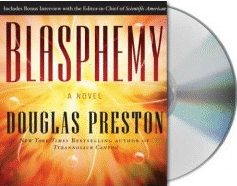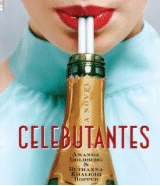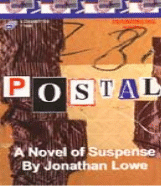February 2008
THE LOWE DOWN ON AUDIOBOOKS
by Jonathan Lowe
 Are
science and religion compatible? No, says Douglas Preston
in an interview following the audio production of his novel
BLASPHEMY. This high concept thriller tackles
the question of God by positing a particle accelerator powerful
enough to probe the hidden dimensions where God is thought
to live. At such extreme temperatures anything is possible--even
a mini black hole or singularity where the laws of physics
break down in a recreation of that rarified environment
milliseconds after the Big Bang. Sides are quickly drawn
between the scientist whose vision initiated the development
of "Isabella," and a televangelist who plans to
use the machine to propel his own career. With the fate
of science as mankind's new religion, the main characters
in Preston's novel each have their roles in the climactic
turn of events. Rev. Don T. Spates succeeds in goading his
evangelical Christian followers into murdering, rampaging
zealots, bent on stopping lead scientist William North Hazelius
(called the AntiChrist) at any cost. Bellowing Scripture
like a rabid wolf, Spates attacks with melodramatic glee,
in narrator Scott Sowers' interpretation. Meanwhile, Hazelius
may or may not be lying about what he's discovered in that
other-dimensional "world." Ultimately, although
nothing is really answered at the conclusion (Preston isn't
stupid), the novel is an entertaining examination of the
science/ religion schism, by the author of Tyrannosaur Canyon,
Jennie, and The Codex. A bonus here, as revealed in Preston's
interview with the editor of Scientific American, is that
we also learn what a fraud L. Ron Hubbard (founder of Scientology)
may have been, to boot. (Sound Library on CD, or Audible.com
as download; 14 hours unabridged) Are
science and religion compatible? No, says Douglas Preston
in an interview following the audio production of his novel
BLASPHEMY. This high concept thriller tackles
the question of God by positing a particle accelerator powerful
enough to probe the hidden dimensions where God is thought
to live. At such extreme temperatures anything is possible--even
a mini black hole or singularity where the laws of physics
break down in a recreation of that rarified environment
milliseconds after the Big Bang. Sides are quickly drawn
between the scientist whose vision initiated the development
of "Isabella," and a televangelist who plans to
use the machine to propel his own career. With the fate
of science as mankind's new religion, the main characters
in Preston's novel each have their roles in the climactic
turn of events. Rev. Don T. Spates succeeds in goading his
evangelical Christian followers into murdering, rampaging
zealots, bent on stopping lead scientist William North Hazelius
(called the AntiChrist) at any cost. Bellowing Scripture
like a rabid wolf, Spates attacks with melodramatic glee,
in narrator Scott Sowers' interpretation. Meanwhile, Hazelius
may or may not be lying about what he's discovered in that
other-dimensional "world." Ultimately, although
nothing is really answered at the conclusion (Preston isn't
stupid), the novel is an entertaining examination of the
science/ religion schism, by the author of Tyrannosaur Canyon,
Jennie, and The Codex. A bonus here, as revealed in Preston's
interview with the editor of Scientific American, is that
we also learn what a fraud L. Ron Hubbard (founder of Scientology)
may have been, to boot. (Sound Library on CD, or Audible.com
as download; 14 hours unabridged) |
 Amanda
Goldberg and Ruthanna K. Hopper take aim at Hollywood in
CELEBUTANTES, a novel which follows the
misadventures of Lola Santisi, an ex model and the daughter
of a famed director. Lola has been downgraded to the role
of a hanger-on, with the new job of trying to convince true
celebrities to wear a relatively unknown fashion designer's
gowns to the Oscar show. She and her friends, (a talent
agent and a struggling actress), move through the maze of
parties and preparations leading up to the Oscars, noting
the choices everyone ("who's anyone") makes, from
"exquisite" to "fashion road kill."
It's a vain and vicious world, where privileged multi- millionaires
look down their noses on those beneath them on the party
list, and demand payoffs and bribes to appear at events.
(Or to wear certain designer labels). The authors drop every
name in the Variety register, making metaphoric comparisons,
and revealing how silly it all is, while Lola is told by
her Hollywood therapist to wear a yellow rubber band and
to "snap it" whenever she begins to fall for "another
actor." (Like the one who broke her heart.) Still,
with all the comedic excess on display, amid disparaging
their unreal tabloid life, Lola and friends still seem enamored
by the glitz, and Lola herself, as narrator, remains trapped
by her past. Secretly wanting to find a decent man and to
live a normal, happy life, she can't, in the meantime, help
but to notice and to name every high-end brand and label
in sight---an entire lexicon of Robb Report products from
Gucci and Fendi to designer facials made with the placentas
of sheep. Before the week is over, and the Vanity Fair after-party
arrives, Lola must come to terms with her insecurities,
however. As guide, reader Gigi Bermingham plays to these
insecurities with aplomb, revealing the desperate side of
Lola's character with just the right angst. leaving the
listener guessing about whether Lola will surrender her
fears about becoming just another one of us "little
(but normal) people." (Highbridge Audio; 9.5 hours
unabridged) Amanda
Goldberg and Ruthanna K. Hopper take aim at Hollywood in
CELEBUTANTES, a novel which follows the
misadventures of Lola Santisi, an ex model and the daughter
of a famed director. Lola has been downgraded to the role
of a hanger-on, with the new job of trying to convince true
celebrities to wear a relatively unknown fashion designer's
gowns to the Oscar show. She and her friends, (a talent
agent and a struggling actress), move through the maze of
parties and preparations leading up to the Oscars, noting
the choices everyone ("who's anyone") makes, from
"exquisite" to "fashion road kill."
It's a vain and vicious world, where privileged multi- millionaires
look down their noses on those beneath them on the party
list, and demand payoffs and bribes to appear at events.
(Or to wear certain designer labels). The authors drop every
name in the Variety register, making metaphoric comparisons,
and revealing how silly it all is, while Lola is told by
her Hollywood therapist to wear a yellow rubber band and
to "snap it" whenever she begins to fall for "another
actor." (Like the one who broke her heart.) Still,
with all the comedic excess on display, amid disparaging
their unreal tabloid life, Lola and friends still seem enamored
by the glitz, and Lola herself, as narrator, remains trapped
by her past. Secretly wanting to find a decent man and to
live a normal, happy life, she can't, in the meantime, help
but to notice and to name every high-end brand and label
in sight---an entire lexicon of Robb Report products from
Gucci and Fendi to designer facials made with the placentas
of sheep. Before the week is over, and the Vanity Fair after-party
arrives, Lola must come to terms with her insecurities,
however. As guide, reader Gigi Bermingham plays to these
insecurities with aplomb, revealing the desperate side of
Lola's character with just the right angst. leaving the
listener guessing about whether Lola will surrender her
fears about becoming just another one of us "little
(but normal) people." (Highbridge Audio; 9.5 hours
unabridged) |
 Turning
to health, heart physician Dr. Dean Ornish is a middle
aged man with a near zero index of vein obstruction, meaning
he's got one of the most healthy hearts around. So if
you're overweight from years of holiday cheese balls,
and worried about your chances for a heart attack, a life
saving tip might be to listen to his latest book, THE
SPECTRUM. The title refers to Ornish's system
of measuring the health qualities of various foods, from
one to five--with one being the most healthy and five
being the least. He then lets the listener decide which
of the five groupings best fit their own needs and desires.
That is, instead of just saying "never eat this,"
Ornish simply relates the facts behind various foods,
and leaves motivation alone. (ie. "You can lead a
horse to water...") Some surprising things I learned
in listening is that olive oil is inferior to canola oil,
although both are superior to animal fats. Coffee leaches
calcium from bones, while green tea strengthens bones.
And spices are very important too, particularly turmeric,
which can help prevent Alsheimers while lowering chronic
inflammation, (one of the silent causes of disease). Also,
fiber's TRUE benefit is that it makes you feel full, and
since it's taken out of most grains (to give snacks longer
shelf life) the result is overeating and $$$diabetes$$$
(Sorry, can't resist the dollar signs here, considering
latest cost reports in the news). Finally, Ornish says
that doctors are trained and paid to do heart surgery
like stints and by-pass operations, but these have very
poor results compared to radical diet and lifestyle changes.
Medicare has finally agreed with him, and is now funding
his own program, after wasting billions on typically ineffective
surgeries while nearly bankrupting itself. A fascinating
short but comprehensive book on diet, The Spectrum is
read by the author, with the aid of Anne Ornish, who connects
the body with the mind by offering guided meditations.
A memorable quote from the audiobook: "If something
has a long shelf life, your own shelf life won't be so
long, if you eat it." (Random House Audio; 3
1/2 hours abridged) Turning
to health, heart physician Dr. Dean Ornish is a middle
aged man with a near zero index of vein obstruction, meaning
he's got one of the most healthy hearts around. So if
you're overweight from years of holiday cheese balls,
and worried about your chances for a heart attack, a life
saving tip might be to listen to his latest book, THE
SPECTRUM. The title refers to Ornish's system
of measuring the health qualities of various foods, from
one to five--with one being the most healthy and five
being the least. He then lets the listener decide which
of the five groupings best fit their own needs and desires.
That is, instead of just saying "never eat this,"
Ornish simply relates the facts behind various foods,
and leaves motivation alone. (ie. "You can lead a
horse to water...") Some surprising things I learned
in listening is that olive oil is inferior to canola oil,
although both are superior to animal fats. Coffee leaches
calcium from bones, while green tea strengthens bones.
And spices are very important too, particularly turmeric,
which can help prevent Alsheimers while lowering chronic
inflammation, (one of the silent causes of disease). Also,
fiber's TRUE benefit is that it makes you feel full, and
since it's taken out of most grains (to give snacks longer
shelf life) the result is overeating and $$$diabetes$$$
(Sorry, can't resist the dollar signs here, considering
latest cost reports in the news). Finally, Ornish says
that doctors are trained and paid to do heart surgery
like stints and by-pass operations, but these have very
poor results compared to radical diet and lifestyle changes.
Medicare has finally agreed with him, and is now funding
his own program, after wasting billions on typically ineffective
surgeries while nearly bankrupting itself. A fascinating
short but comprehensive book on diet, The Spectrum is
read by the author, with the aid of Anne Ornish, who connects
the body with the mind by offering guided meditations.
A memorable quote from the audiobook: "If something
has a long shelf life, your own shelf life won't be so
long, if you eat it." (Random House Audio; 3
1/2 hours abridged)
|
 Finally,
what makes a good narrator? Well, obviously, it’s
in the voice. A sonorous and pleasing voice is preferable
to one that sounds like it’s coming over the speaker
at a fast food drive-through. “Want fries with that?”
No, thank you. Given a rich or interesting voice, the
really good reader enunciates clearly. Words must be crisp
and precise in the telling. Finally, a reader must not
sound like they are reading, and should be able to present
a realistic interpretation. This requires acting skills
to jump between dialog, narration, and action while using
appropriate dialects and different character voices. It’s
rare to find a reader who possesses all of these qualities--golden
voice, precise diction, acting skills, versatile dialects.
One of the pioneers of the industry was Frank Muller,
who beganrecording in the '70s, and along with Barbara
Rosenblat, propelled audiobooks out of the vinyl phonograph
world into the realm of Recorded Books (tapes and CDs
found in libraries everywhere). I had the privilege of
having Frank record my own first novel, POSTAL,
for The Publishing Mills in 1999, for which he won another
of his many Earphones awards. Later, I interviewed him
for Cracker Barrel Old Country stores, and was there when
one of his last recordings, TISHOMINGO BLUES,
by Elmore Leonard, won the prestigious Audie award. (The
industry's "Oscar.") The motorcycle accident
that ended Frank's career did not, thankfully, end his
life or his spirit, and so now, especially if you are
new to audiobooks, you owe it to yourself to sample his
work. Finally,
what makes a good narrator? Well, obviously, it’s
in the voice. A sonorous and pleasing voice is preferable
to one that sounds like it’s coming over the speaker
at a fast food drive-through. “Want fries with that?”
No, thank you. Given a rich or interesting voice, the
really good reader enunciates clearly. Words must be crisp
and precise in the telling. Finally, a reader must not
sound like they are reading, and should be able to present
a realistic interpretation. This requires acting skills
to jump between dialog, narration, and action while using
appropriate dialects and different character voices. It’s
rare to find a reader who possesses all of these qualities--golden
voice, precise diction, acting skills, versatile dialects.
One of the pioneers of the industry was Frank Muller,
who beganrecording in the '70s, and along with Barbara
Rosenblat, propelled audiobooks out of the vinyl phonograph
world into the realm of Recorded Books (tapes and CDs
found in libraries everywhere). I had the privilege of
having Frank record my own first novel, POSTAL,
for The Publishing Mills in 1999, for which he won another
of his many Earphones awards. Later, I interviewed him
for Cracker Barrel Old Country stores, and was there when
one of his last recordings, TISHOMINGO BLUES,
by Elmore Leonard, won the prestigious Audie award. (The
industry's "Oscar.") The motorcycle accident
that ended Frank's career did not, thankfully, end his
life or his spirit, and so now, especially if you are
new to audiobooks, you owe it to yourself to sample his
work.
 As
an example, TISHOMINGO BLUES features
one of Elmore Leonard's typically eccentric characters,
the high diver Dennis Lenahan. Lenahan works at a lodge
and casino in Tunica, Mississippi, and while up on the
diving board one day witnesses a mob hit. A second witness
is Robert Taylor, a shady Civil War reenactment participant
who lures Dennis into his varied schemes. Both men seem
to take naturally to their respective death wishes, and
also seem to have weaknesses for women who could also
get them killed. With a background of Delta blues, wacky
Civil War buffs, and reputed deals with the devil, the
novel hums along under the steady and engaged voice of
Muller, who lends to Leonard's quirky dialogue his own
brand of ambient energy. (Recorded Books & Harper
Audio; 7.5 hours unabridged) As
an example, TISHOMINGO BLUES features
one of Elmore Leonard's typically eccentric characters,
the high diver Dennis Lenahan. Lenahan works at a lodge
and casino in Tunica, Mississippi, and while up on the
diving board one day witnesses a mob hit. A second witness
is Robert Taylor, a shady Civil War reenactment participant
who lures Dennis into his varied schemes. Both men seem
to take naturally to their respective death wishes, and
also seem to have weaknesses for women who could also
get them killed. With a background of Delta blues, wacky
Civil War buffs, and reputed deals with the devil, the
novel hums along under the steady and engaged voice of
Muller, who lends to Leonard's quirky dialogue his own
brand of ambient energy. (Recorded Books & Harper
Audio; 7.5 hours unabridged)
|
|